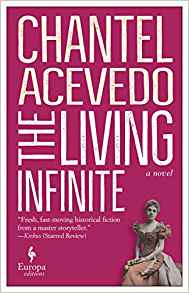The Living Infinite
Chantel Acevedo takes the true life of the Spanish Infanta Eulalia, born to Queen Isabella in 1864, and weaves in the fictional characters of Amalia and Tomás. Amalia is hired as the nodriza (wet nurse), and she and her infant, Tomás, move into the palace. When Amalia’s job is done, they return to their conventional lives, but a strong connection remains. Eulalia grows up within the strict rules and confines demanded of her as a royal. Tomás grows up with a love of books and is fortunate to be gifted a bookstore. When Eulalia writes about her life and political opinions, she asks Tomás to take the manuscript to a publisher friend. It is soundly refused: “women cannot demand perforce their share in the freedoms afforded to men.” What she wrote was scandalous to the royal family and treasonous to Spain. Tomás has suffered a terrible loss, and he wants to escape the confines of his life. America seems to be the answer for both.
This book is about the struggle against the finiteness of life. The writings of Jules Verne are influential in Tomás’s life. Verne compared the sea to life: “The sea is everything… it is the Living Infinite.” Tomás felt the limits society placed on him as a member of the lower class. Eulalia certainly felt it as a royal in the public eye and more importantly as a woman.
This is a wonderful novel addressing our limits and possibilities and how far we should go in the quest to go beyond the confines of the life we are given. In the end, infinite possibilities may only lie in remembrances and in one’s children. Acevedo has penned a thought-provoking and flawlessly written book with strong characters and an engaging plot. It’s truly a marvelous read that I didn’t want to end.










